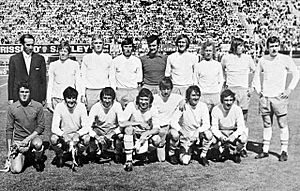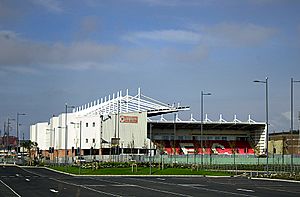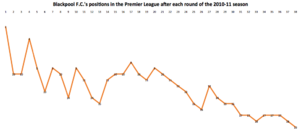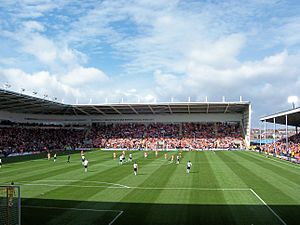Blackpool F.C. facts for kids
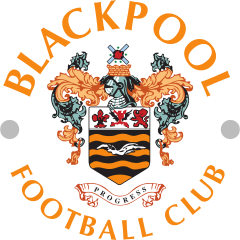 |
||||
| Full name | Blackpool Football Club | |||
|---|---|---|---|---|
| Nickname(s) |
|
|||
| Short name | Blackpool | |||
| Founded | 26 July 1887 | |||
| Ground | Bloomfield Road | |||
| Capacity | c. 16,500 | |||
| Owner | Simon Sadler | |||
| Head coach | Steve Bruce | |||
| League | League One | |||
| 2018–19 | League One, 10th of 24 | |||
|
||||
Blackpool Football Club is a professional association football team from Blackpool, England. They are known as The Seasiders or The Tangerines because of their bright orange shirts. The club plays in EFL League One, which is the third level of English football.
Blackpool FC was started in 1887. They played at different grounds before moving to their current home, Bloomfield Road, in 1901. The team first joined the Football League Second Division in 1896. Since 1923, Blackpool has worn their famous tangerine-coloured shirts.
The club had a "golden period" in the 1950s under manager Joe Smith. They reached the FA Cup final three times, winning it in 1953. This famous win is often called the "Matthews final" because of the amazing performance by player Stanley Matthews. In 1956, Stanley Matthews was the first player ever to win the Ballon d'Or award.
Blackpool has a unique record: they are the only club to have been promoted through all three levels of the Football League using the play-off system. They reached the Premier League in 2010, which was a huge achievement. After one season there, they moved between different leagues. In 2021, they were promoted to the EFL Championship, but returned to League One in 2023.
Contents
Club History
How Blackpool FC Started (1887–1900)
Football began in Blackpool around 1877. On July 26, 1887, a new club was formed to represent the whole town, and it was named Blackpool Football Club.
In their first season (1887–88), Blackpool won two trophies: the Fylde Cup and the Lancashire Junior Cup. They later became founding members of the Lancashire League in 1889. After finishing as runners-up for three seasons, they won the championship in their fourth attempt.
Blackpool's first home ground was Raikes Hall, which was part of a big entertainment complex. This helped the club attract around 2,000 fans per game, making their early years a financial success.
In 1896, Blackpool joined the Football League Second Division. Their first League game was on September 5, 1896, against Lincoln City, which they lost 3–1. After a short time playing at the Athletic Grounds, they returned to Raikes Hall. In 1899, they were not re-elected to the Football League but rejoined in 1900. Around this time, Blackpool merged with local rivals South Shore and moved to Bloomfield Road.
Early 20th Century Success (1900–1946)
In the early 1900s, Blackpool's best finish was seventh place in 1910–11. After First World War ended, Bill Norman became Blackpool's first full-time manager. He led the club to fourth-place finishes in his first two seasons.
In 1923–24, Harry Bedford was the country's top league scorer with 32 goals. He repeated this amazing feat the next season.
In 1929–30, under manager Harry Evans, Blackpool won the Division Two championship, their only championship title to date! Jimmy Hampson scored an incredible 45 goals out of the team's 98 league goals that season.
Blackpool spent three seasons in the First Division before being relegated. In 1935, Joe Smith became manager, staying for 23 years. In his second season (1936–37), Blackpool finished second in the Second Division and were promoted back to the First Division.
The Golden Era (1946–1967)
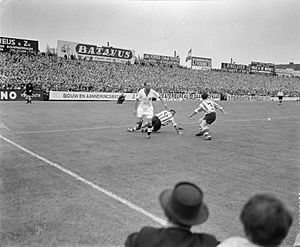
After the Second World War, Blackpool signed key players like Stan Mortensen and Stanley Matthews. These players, along with others like Hugh Kelly, Tommy Garrett, Jackie Mudie, George Farm, and Bill Perry, made the 1950s the most successful time in the club's history.
Blackpool reached the FA Cup final three times after the war. They lost in 1948 and 1951 but won the cup in 1953, beating Bolton Wanderers 4–3 in a thrilling comeback.
In 1955–56, Blackpool achieved their highest-ever finish in the Football League, coming in second place behind Manchester United. Joe Smith, the long-serving manager, left the club in 1958.
Ron Suart took over as manager. In 1960–61, the League Cup started. Blackpool avoided relegation from the First Division by just one point that season. In 1961, the legendary Stanley Matthews, at 46 years old, was sold back to Stoke City. Blackpool was relegated from the First Division in 1967.
Later 20th Century (1967–2000)
Stan Mortensen, a former player, became manager. In 1967–68, Blackpool nearly returned to the First Division but missed out by a small goal difference. Mortensen was later replaced by Les Shannon.
Shannon successfully guided Blackpool back to the top flight in 1969–70. However, they were relegated again the next season. In June 1971, Blackpool won the Anglo-Italian Cup, beating Bologna 2–1. This made them the only Lancashire club to win a European trophy.
Blackpool spent several seasons in the Second Division, narrowly missing promotion twice. In 1978, they were relegated to the Third Division for the first time. The club faced more challenges, including another relegation to the Fourth Division in 1981.
Sam Ellis became manager in 1982. In 1984–85, Blackpool finished second and were promoted back to Division Three. In 1986, Owen Oyston bought the club. The club faced challenges under the Oyston family's ownership, including legal issues involving Owen Oyston in 1996, which led to his wife and son taking over management roles.
Blackpool was relegated to the Fourth Division again in 1990. They gained promotion back to Division Two in 1992 through the play-offs, winning a penalty shootout at Wembley. After struggling in Division Two, manager Billy Ayre was replaced by Sam Allardyce in 1994. Allardyce led them to the play-offs in 1995–96, but they lost in the semi-finals.
Reaching the Premier League (2001–2010)
In 2000, Blackpool was relegated to the Third Division (fourth tier). Under manager Steve McMahon, they were promoted back to Division Two in 2001 by winning the play-offs. They also won the Football League Trophy twice, in 2002 and 2004.
Simon Grayson became manager in 2005. In 2006–07, Blackpool finished third in League One and won the play-offs, beating Yeovil Town 2–0 at the new Wembley Stadium. This promoted them to the Championship, returning to the second tier after 29 years.
In 2009, Ian Holloway was appointed manager. He signed Charlie Adam for a club-record fee. In 2009–10, Blackpool finished sixth in the Championship, earning a play-off spot. They beat Nottingham Forest in the semi-finals.
On May 22, 2010, Blackpool defeated Cardiff City 3–2 in the Championship play-off final at Wembley. This incredible win promoted them to the Premier League for the first time in 39 years! Blackpool became the first club to be promoted from every division of the Football League through the play-off system. This match was called "the richest game in football" because of the huge financial boost the winning team received.
Premier League Season (2010–11)
Blackpool's first-ever Premier League match was on August 14, 2010, where they beat Wigan Athletic 4–0. This put them at the very top of the English football pyramid for a short time.
On May 22, 2011, exactly one year after their promotion, Blackpool was relegated back to the Championship after losing 4–2 to champions Manchester United on the final day of the season. Despite predictions they wouldn't do well, Blackpool earned 39 points from 38 games, including wins against Liverpool and Tottenham Hotspur.
Moving Between Leagues (2011–2017)
In 2011, Charlie Adam was sold to Liverpool for a club-record fee. In 2012, Blackpool reached the Championship play-off final again but lost 2–1 to West Ham United.
Manager Ian Holloway left in November 2012. The club had several managers in a short period. In 2014, José Riga became Blackpool's first manager from outside the UK. Before the 2014–15 season, many players left the club, causing a big crisis. Blackpool was relegated to League One in April 2015.
In May 2015, a match against Huddersfield Town was stopped by fans protesting against the club's owners. In May 2016, Blackpool was relegated for a second time in a row, falling to the bottom tier of English professional football. However, under manager Gary Bowyer, Blackpool won promotion back to League One in May 2017, winning their fifth play-off final, making them the most successful team in English play-off history.
New Ownership (2017–Present)
In November 2017, the Oyston family put Blackpool FC up for sale. In February 2019, the club was placed into receivership by the High Court, which meant the Oyston family's control was removed.
On June 13, 2019, Simon Sadler, a businessman born in Blackpool, became the new owner, ending the Oystons' 32-year ownership.
Terry McPhillips resigned as manager in July 2019 and was replaced by Simon Grayson for his second time in charge. In March 2020, Neil Critchley became the new head coach.
At the end of the 2020–21 season, Blackpool was promoted back to the Championship after winning the 2021 League One play-off final. This was their sixth play-off final victory.
In June 2022, Neil Critchley left, and Michael Appleton returned as manager. However, Appleton was sacked seven months later. Mick McCarthy took over, but Blackpool was relegated to League One in April 2023. Neil Critchley returned for a second time as manager in the summer of 2023. He was sacked in August 2024, and Steve Bruce was appointed head coach on September 3, 2024.
Team Colours
Blackpool first started wearing tangerine for the 1923–24 season. This colour was suggested by a referee who was impressed by the Dutch national team's orange shirts.
Before tangerine, the team wore blue-and-white stripes, red or white shirts, and even black, yellow, and red during the First World War to support Belgian refugees. After the war, they wore white shirts and navy-blue shorts. In 1934, they tried dark and light blue stripes, but by 1939, they settled on tangerine as their main colour. Today, their kit usually includes tangerine shirts, white shorts, and tangerine socks.
Home Stadium
Blackpool has played their home games at Bloomfield Road since 1901. As of April 2025, the stadium can hold about 16,500 fans.
In 2010, the stadium was updated for Blackpool's first Premier League season. A new temporary East Stand was built, and other facilities were improved. A new South Stand, named after former player Jimmy Armfield, opened in 2010. The stadium also has the BFC Hotel, which opened in 2012.
Supporters
Blackpool fans are often called the Tangerine Army or Seaside Barmy Army. Even though Blackpool had the lowest average attendance in the Premier League, their home crowd was known for being loud and creating a great atmosphere.
Many people have praised Blackpool's supporters. In 2009, a journalist noted that "Bloomfield Road does not lack for atmosphere. Or a drummer." In 2010, during their first home Premier League game, the crowd of over 15,500 made a "deafening" amount of noise. The Blackpool support was even ranked as the fifth-loudest in the Premier League, despite their smaller stadium capacity.
Rivalries
Blackpool's main rival is Preston North End. Matches between these two clubs are called the West Lancashire derby.
Since 2012–13, a local rivalry has also grown with Fleetwood Town, known as the Fylde Coast derby.
Blackpool also has rivalries with Bolton Wanderers, Burnley, and Blackburn Rovers.
Players
Current First-Team Squad
|
|
Academy and Youth Development
Blackpool's Academy helps young players develop their skills. It is rated as Category 3, which is a good level. The Academy has around 140 players, from ages six to twenty-one. They train at Myerscough College and Stanley Park.
International Players
Blackpool has had 61 players who have played for their national teams. The first was Fred Griffiths for Wales in 1900. The most recent was CJ Hamilton for the Republic of Ireland in 2022.
Many famous players have represented their countries while playing for Blackpool:
- England: Jimmy Armfield (43 caps), Stanley Matthews (36 caps), Stan Mortensen (25 caps).
- Scotland: Jackie Mudie (17 caps), Allan Brown (11 caps).
- Wales: Glyn James (9 caps), David Vaughan (8 caps).
- Northern Ireland: Derek Spence (15 caps), Craig Cathcart (15 caps).
- Republic of Ireland: Mickey Walsh (4 caps), Wes Hoolahan (1 cap).
- Other Nations: Players from Latvia, Algeria, Australia, Congo, Ghana, Costa Rica, Estonia, Iceland, Jamaica, and Sierra Leone have also played for their countries while at Blackpool.
One-Club Players
Nine players have spent their entire professional careers playing only for Blackpool. These dedicated players include:
- Harry Johnston: Played for 21 years (1934–1955) and made 398 appearances.
- Jimmy Armfield: Played for 17 years (1954–1971) and made 569 appearances, the most for the club.
- Hugh Kelly: Played for 17 years (1943–1960) and made 428 appearances.
Training Facilities
Blackpool's training ground is called the e-Energy Training Centre. It is located in the Squires Gate area. In 2009, manager Ian Holloway called it a "hell hole" because it needed a lot of improvements. The club has since bought a new modular building with better changing rooms, eating areas, and medical facilities.
A new training facility is planned near Grange Park Estate and Baines School. This new facility, along with a permanent East Stand at Bloomfield Road, is expected to cost between £30 and £40 million.
Club Managers
Blackpool FC has had 42 full-time managers, including those who returned for a second time. The longest-serving manager was Joe Smith, who was in charge for 23 years. The shortest-serving manager was Michael Appleton, who lasted only 65 days in his first period.
Jose Riga became the club's first foreign manager in 2014. In 2020, Neil Critchley was the first to be called a "head coach" instead of a manager.
Club Honours
Blackpool has won many trophies and achieved promotions:
League Titles
- Second Division / Championship (Level 2)
- Champions: 1929–30
- Promoted: 1936–37, 1969–70
- Play-off Winners: 2010
- League One (Level 3)
- Play-off Winners: 2007, 2021
- Fourth Division / Third Division / League Two (Level 4)
- Promoted: 1984–85
- Play-off Winners: 1992, 2001, 2017
Cup Wins
- FA Cup
- Winners: 1952–53
- Football League Trophy
- Winners: 2001–02, 2003–04
- Anglo-Italian Cup
- Winners: 1971
- Football League War Cup
- Winners: 1943
- Lancashire Senior Cup
- Winners: 1935–36, 1936–37, 1941–42, 1953–54, 1993–94, 1994–95, 1995–96
Club Records
Team Records
- Highest League Finish: 2nd in Division One (1955–56)
- Lowest League Finish: 21st in Division Four (1982–83)
Player Records
- Most League Appearances: Jimmy Armfield (569 games, from 1954 to 1971)
- Top Goalscorer: Jimmy Hampson (252 goals, from 1927 to 1938)
- Most Capped Player: Jimmy Armfield (43 caps for England)
Manager Records
- Longest-Serving Manager: Joe Smith (22 years, 9 months; from 1935 to 1958)
Tangerine TV
In August 2021, Blackpool launched Tangerine TV. This is their own streaming service for fans. It offers different ways to watch or listen to games and access club content. Fans can buy passes for live streams of matches (for international viewers), or audio commentary for all league games.
Blackpool F.C. Ladies
See also
 In Spanish: Blackpool Football Club para niños
In Spanish: Blackpool Football Club para niños
 | May Edward Chinn |
 | Rebecca Cole |
 | Alexa Canady |
 | Dorothy Lavinia Brown |


